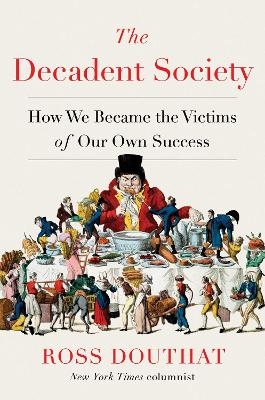
The Decadent Society
How We Became the Victims of Our Own Success
Seiten
2020
Simon & Schuster (Verlag)
978-1-4767-8524-0 (ISBN)
Simon & Schuster (Verlag)
978-1-4767-8524-0 (ISBN)
A powerful portrait of how our age in human history, so superficially turbulent, is actually defined by stagnation, repetition, deadlocks, and decay.
A powerful portrait of how our turbulent age is defined by dark forces seemingly beyond our control from the New York Times columnist and bestselling author of Bad Religion.
The Decadent Society explains what happens when a rich and powerful society ceases advancing—how the combination of wealth and technological proficiency with economic stagnation, political stalemates, cultural exhaustion, and demographic decline creates a strange kind of “sustainable decadence,” a civilizational malaise that could endure for longer than we think.
Ranging from the chaos of Trump-era Washington to the gridlock of the European Union; from our empty cradles to our lonely pathways through middle and old age; from the lost promise of the Space Age and early internet to today’s earthbound surveillance state; from the recycling of Baby Boomer pop culture to the Brave New World we’re making with drugs and virtual reality escapes, Douthat provides an enlightening diagnosis of the modern condition – how we got here, how long our malaise might last, and how, whether in renaissance or catastrophe, our decadence might ultimately end.
A powerful portrait of how our turbulent age is defined by dark forces seemingly beyond our control from the New York Times columnist and bestselling author of Bad Religion.
The Decadent Society explains what happens when a rich and powerful society ceases advancing—how the combination of wealth and technological proficiency with economic stagnation, political stalemates, cultural exhaustion, and demographic decline creates a strange kind of “sustainable decadence,” a civilizational malaise that could endure for longer than we think.
Ranging from the chaos of Trump-era Washington to the gridlock of the European Union; from our empty cradles to our lonely pathways through middle and old age; from the lost promise of the Space Age and early internet to today’s earthbound surveillance state; from the recycling of Baby Boomer pop culture to the Brave New World we’re making with drugs and virtual reality escapes, Douthat provides an enlightening diagnosis of the modern condition – how we got here, how long our malaise might last, and how, whether in renaissance or catastrophe, our decadence might ultimately end.
Ross Douthat is a columnist for the New York Times op-ed page. He is the author of To Change the Church, Bad Religion, and Privilege, and coauthor of Grand New Party. Before joining the New York Times, he was a senior editor for the Atlantic. He is the film critic for National Review, and he cohosts the New York Times’s weekly op-ed podcast, The Argument. He lives in New Haven with his wife and four children.
| Erscheinungsdatum | 31.12.2019 |
|---|---|
| Verlagsort | New York |
| Sprache | englisch |
| Maße | 152 x 229 mm |
| Gewicht | 422 g |
| Themenwelt | Geschichte ► Allgemeine Geschichte ► Zeitgeschichte |
| Sozialwissenschaften ► Politik / Verwaltung ► Politische Theorie | |
| Sozialwissenschaften ► Soziologie | |
| ISBN-10 | 1-4767-8524-4 / 1476785244 |
| ISBN-13 | 978-1-4767-8524-0 / 9781476785240 |
| Zustand | Neuware |
| Haben Sie eine Frage zum Produkt? |
Mehr entdecken
aus dem Bereich
aus dem Bereich
Gewalt, Umwelt, Identität, Methode
Buch | Softcover (2024)
Spector Books OHG (Verlag)
36,00 €
wie Freud im Kollektiv verschwand
Buch | Hardcover (2024)
Klett-Cotta (Verlag)
25,00 €


